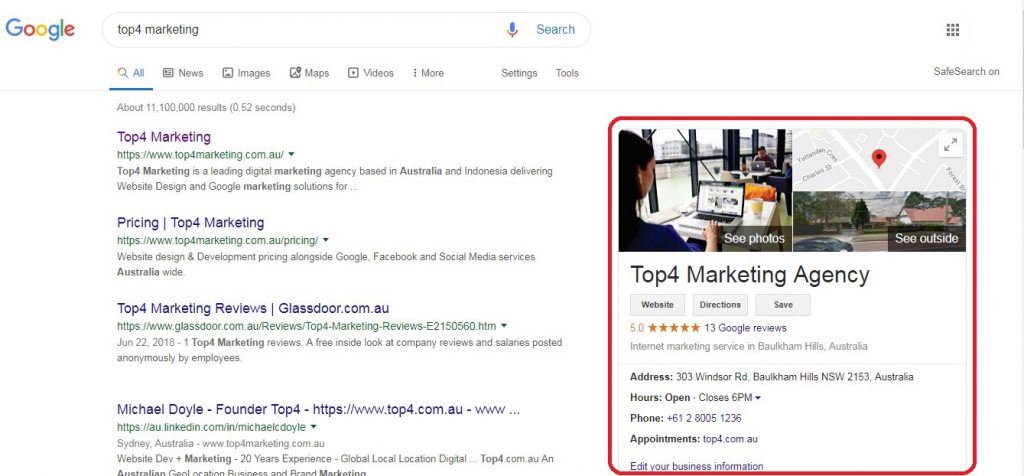Recently, I made the decision to completely remove my company’s Google My Business listing. There are several reasons why I chose to not have my company’s website listed in Google Maps any longer. But what’s more interesting to me is the fact that the website has seen no ill effects by doing it. In fact, I’m seeing a lift in traffic to the site, as well as better search engine rankings overall (for the keywords I’ve been tracking).
Why I Chose To Remove the GMB Listing
There are several reasons why I chose to completely remove the Google My Business listing for my company. But the main reason, the most important reason, is that I do not consider this business to be a “local business”. I think that’s the most important distinction here. Here are the reasons, though, that led to the ultimate decision of why I removed my Google My Business listing:
- The business is not a local business. The customers are not local. After having a Google My Business listing for, let’s say at least 3 years (I’m not sure of the exact time here because I had set up the listing under my personal name and then changed/updated it when my company was officially formed. Let’s say it was at least 3 years.) Looking back over those 3 years, my clients are not local or even located within 100 miles of my location. Most are out of the State of Texas or international.
- I don’t expect to get any customers from within 50 miles of my location. I don’t expect to get, at any time soon, or even accept any clients that are located within 50 miles of my business location. I am in a very unique situation and a particularly unique location. I’m outside of a major metro area (Dallas/Fort Worth Texas), and my ideal customers are not located here. I live in an area with two very distinct types of residents: lower income residents and local business owners who would never be clients or part-time residents that have “vacations homes” or “lake houses”.
- While the business does qualify for a GMB listing, no customers would ever show up at my location. The business technically qualifies for a Google My Business listing. There is a physical office with its own entrance, properly marked with signage. The business has office hours. Customers and even potential customers can easily drive to the location at any time. The only visitors that have come to the business location/office are the news media.
- I believe that tying this business to a location has ultimately hurt traffic to the website. This is an important distinction here. I believe that when there is a location tied to a website that there is the potential for the search engines to “customize” the search results for users, only showing that business to certain users who are within a certain radius of that business. I’m not referring to Google Maps or even when they choose to show the local business in the Knowledge Panel. This is the organic search results. More on this later.
- Related Businesses that showed up are not related at all. I think this was also an important distinction here. In this particular case, the business is in the digital marketing industry. However, any time the business Knowledge Panel was shown, local internet providers, phone companies, and cellular providers’ offices was shown as being “related’. Truly there actually, technically, are no other businesses in the area that are “related”, or even in the same industry. So, Google was choosing to show the closest thing they had: which was not even close to being related.
- The local keywords were all wrong. This is actually interesting. On the Google My Business dashboard area, Google provides insights. They provide, for example, keywords that the local business is being found for. The data is extremely limited, but the main keywords were “lawyers near me”, “lawyers”, and sometimes keywords related to therapists. One or two “marketing” searches. Just “marketing”, not anything related to digital marketing or online marketing. This is interesting and confirmed my suspicions all along: no local clients or even the possibility for local clients, as no one searches for digital marketing or online marketing keywords. I showed up for “lawyer” keywords locally because of the extensive expert witness work I do (law firms hire me). But I’m not a lawyer, never claimed to be one, and never will be a lawyer. That just goes to show how flawed Google can be at times.
- I’ve never had any local leads. Again, this is important here: even though I literally have been dominating all related keywords, anything possible related to digital marketing, for 3 years, not one single call or lead (i.e., contact form fill, email, etc.) from anyone local in my area. Sure, there’s been traffic and visibility (even tons of photo views on the GMB listing). But no leads. Again, this proved to me that my business is not a local one.
When I looked at all of those reasons, as well as the potential for Google to be seeing me as a local business when I’m not, I was convinced, 100 percent, that I needed to completely remove my Google My Business listing. Let’s talk a bit more, though, about the potential for “local bias” in the search engine results, which includes customization.
Local Bias in Search
Let’s put Google My Business and Google Maps listings aside for a minute and only talk about the organic search engine results. There is definitely a local bias when it comes to the organic search engine results, and in many cases it’s a good thing. Let’s look at an example, using the keyword “real estate”.
When I search for “real estate” in Google, I get results that are different (remember I’m only referring to the organic results, not paid and not Google Maps) than you get when you search for “real estate” from your location. When I search for “real estate”, I get national sites, local sites, and local pages on national sites. Google knows my location is in Mabank, Texas. So, I see something like this:
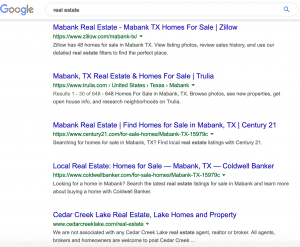
Notice that there are national sites, local pages on national sites, and even local sites that rank for a big, competitive keyword “real estate”. That’s customization at work. Search for “real estate” from your location and you’ll get different results than I do. If I’m 30 miles away in Kaufman, Texas, I’m going to get some Kaufman, Texas results in there. That’s the local bias I’m talking about here. If Google knows and understands my business location (the location of my business), then there’s a chance that I would (or my site would) only show up for keywords when users near me searched for a keyword.
“If the search engines know the business is in a particular location, it can receive less traffic.”
That’s right. That’s what I’m saying here. If the search engines see you as a local business, then the site could actually see less organic search traffic. If it’s not tied to a particular location, then it could potentially see more traffic from organic search. Again, this is for organic search (not the Google Maps or any maps listings).
Let’s look at one specific example, and I’ve talked with the business owner (site owner) about this issue he had. I have permission to share it here. The business is Ticketstub.com. They essentially are resellers of concert tickets, football tickets, and event tickets. One example keyword would be “college football tickets”. That’s a generic keyword with no local search intent. Not “UCLA college football tickets” but “college football tickets”. “UCLA college football tickets” could have a local search intent. In the case of Ticketstub, there were being found for that keyword whether you searched for it from Florida, from Chicago, or from New York. Didn’t matter. Lots of good traffic, nationally. But, one day the site owner decided to create a Google My Business listing. Google then saw Ticketstub as a local business, located in Chicago. What happened? The “national” keyword traffic dropped drastically. I confirmed that if I searched from an IP address indicating that I was somewhere in the Chicago area (“college football tickets”) the site ranked. But searching from Texas, Florida, or New York, nowhere to be found anymore. For this national business that has customers nationwide, it was devastating to lose those search engine rankings and the traffic. Ticketstub.com removed their GMB listing and traffic eventually came back because they no longer was seen as a “local business”.
Are You Local or National?
The important distinction here is this: are you local or national? Do you have customers that are local? Even if they don’t visit your office or your location, are your customers local to you? Or, do you have a website, perhaps an e-commerce website, and your customers are national? Sure, you could have some customers who buy from you that are from your area. But are you a local business or not? My point here is that if you are not truly a local business, then tying your business or website to a location can have certain consequences that you might otherwise not think of. At the very worst, you could be losing a lot of traffic from organic search because you’re seen as being a local business.
If You’re National, Remove References to a Location
If you’re a national business, and you only do business online, why do you have a Google My Business listing? I’ve heard some say tell me that their reasoning is this: Google My Business is a Google property, and it gives my site “credibility”. I don’t buy that school of thought. I’ve actually checked the Google Knowledge Graph data (you can query the KG via the API) and while a GMB listing will give the business a /g/ ID, it isn’t a part of the Knowledge Graph. So there is no entity so to speak–there are other, better ways to get a Knowledge Graph entry for your business, so in my opinion, a GMB listing doesn’t give that business any increased “authority” so to speak. That discussion is a long one and I’d rather leave it for another post or even an upcoming podcast.
If your website or business is a national one, then you should remove references to a particular location. Sure, keep the contact page on your site along with your actual business location and address. That’s important, as customers and website visitors need to know who to contact if they want to contact you. But, do you really need local schema markup code on all your pages or on your home page? Probably not. Do you need a Google My Business listing? No. You don’t need a Google My Business listing to rank well in the search engine results pages. You don’t need a GMB listing unless you’re a local business.
What Happened When I Removed My GMB Listing
Well, let’s take a quick look at what happened when I removed my Google My Business listing. Keep in mind that i was ranking for generic keywords like “SEO” and “SEO consultant” (my GMB listing showed up in the Knowledge Panel for these keywords). But, since no one in my area searches for those keywords (except for me), there is not traffic. So, I didn’t lose any traffic. In fact, I am pretty sure I actually am seeing a lift in traffic after I removed the GMB listing.
The Google My Business listing was removed July 22, 2019. So, I looked at traffic both in Google Search Console and in Google Analytics after and compared it to the traffic after. Here’s what I see after about 10 days. Of course, GSC data is delayed, so the time periods are not exactly the same between GSC and GA:
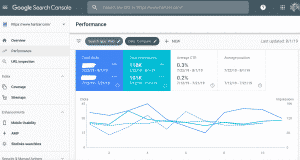
Above is the GSC data before/after removing the Google My Business listing.
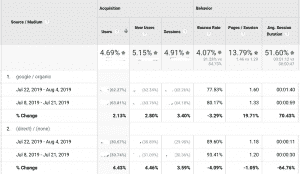
Above is the Google Analytics data for the period before versus after removing the Google My Business listing.
I don’t really think the actual traffic numbers are relevant, so I’ve removed them in the screen captures. But as you can see, there’s been a lift in traffic about 10 days after the GMB listing was removed.
Oh, and let’s take a quick look at rankings. I’m tracking about 100 keywords overall in SEMrush:
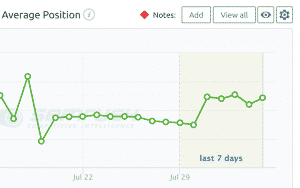
What’s important to note, and I think is an important distinction here, is the fact that the keywords that the site has been found for and is ranking for have been “generic” keywords that do not include a location. For example:
“keyword”
vs.
“cityname keyword”
If the site had traffic from searches, at any time, ranking for “cityname keyword” then there would have been the possibility that the site would lose traffic. But, in this case the site DID rank for “Mabank SEO” but there was never any search traffic for that keyword. So, there was no “cityname” keyword” traffic to lose by removing the location and removing the Google My Business listing.
Did Brand Searches Affect Traffic?
There have been some comments from others about the brand searches. While there are “some” brand search queries, it’s a relatively new brand, so I’m pretty sure that these brand searches (i.e., Hartzer Consulting) are only me searching, so there’s not going to be much of an effect here on traffic. In this case, some have suggested that they were searching for the brand and hitting the GMB listing and the maps listing before and now they’re just going to the site. In this case, well, that’s not really possible, as there never was a lot of brand search queries for this brand.
There are certainly cases that I recommend keeping a Google My Business listing–and not removing it. But for certain businesses or even websites that have “national” customers and not any “local” customers, it doesn’t make any sense to have a GMB listing. In my case, which I think is fairly unique, I am seeing a positive effect after removing my Google My Business listing.
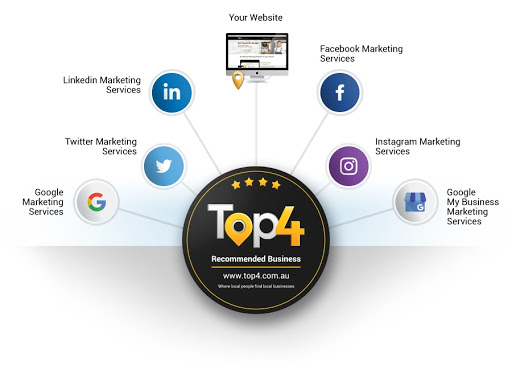
Looking to build customer loyalty through social media? Don’t forget to add your business to Top4 Marketing
List your business, create your own digital store to sell goods and services, and share posts on social media. Promote your business on Google instantly! Should you need help with local digital marketing then view our new Google Marketing Platform and services Top4 Marketing
Get Found On Google Promote Your Website, Reach local customers today!
Our Digital Marketing Agency Services Across All Industries Include Search Engine Optimisation (SEO), Google Marketing, Website Design, Corporate Web Development, and local location-based marketing using our own Google Marketing Platform!
Engage A Social Media Agency For Only 1/3 The Cost Of Employing A Social Media Manager…LET’S TALK!
Source: Bill Hartzer

